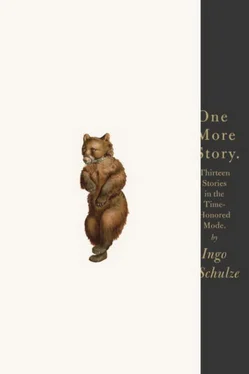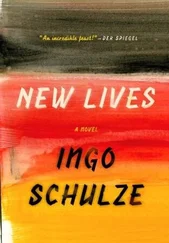Because the driver was tugging at my pants leg, I missed the moment when the net was heaved onshore. What I now saw, however, as the men ran to deposit their catch in an assortment of basins, was devastating. Next to nothing — at best a dozen fish, none any larger than each of us had dined on the night before. The muddle of men and children swarming around the basins made it impossible to tell how the catch was divided up.
Tired and wanting to get out of the blazing sun, I gave in to the short driver and boarded his carriage. Sheila, of that I was certain, would never have ridden in a tourist carriage. And yet it really was better for the driver to earn ten euros rather than not to earn them — and after all, carriages are in fact made to transport people. Besides, in my present condition, Fort Qaitbey, which I believed I was duty bound to visit, was too far for me to have risked the long march along the Corniche. The fort, which crowns the western arm of the harbor basin, was erected atop the ruins of Pharos, there where the great lighthouse of antiquity once stood.
The relief I felt plumping down onto the leather seat removed my last doubt.
I sat leaning back in the carriage — the pedestrians we passed couldn’t see me — staring at the driver’s bent back, the horse’s rear end, and, just above it, the knots of a whip swinging back and forth.
Now that all this is coming back to me hour by hour, I see the numerous details — which for anyone else would fit nicely into a normal travelogue — as a chain of clues, as evidence. All of it, or almost all, pointing toward the denouement.
I had him drop me off at the fort, followed all the paths like a good tourist, gazed out at the sea, surveyed the shore promenade and the library, and put up with schoolboys mocking my long hair — which evidently met with general disapproval here — even after their fourth or fifth barrage of Luti, luti , which I found merely disgusting.
My driver greeted me with a loud “Hello!” and suggested we take a detour past a long row of waiting carriages, past a real fish market in its own hall, outside which a couple of women were hawking small fish while repeatedly pouring water over them. We drove to a palace my driver thought I ought to see and, standing up in the carriage, I gawked at it through a massive grated gate. Three schoolgirls ran alongside us, giggling, calling out something, falling back, only to reappear beside me. I could come up with nothing better than a grin. They kept up their game until the old man jumped down from his box, shooed the girls off, and then resumed my dandified jaunt in the direction of the Library of Alexandria. I wanted to give the driver fifteen euros instead of the ten agreed upon, he had driven out of his way, after all. He, however, protested and demanded thirty. He began to bombard me with loud explanations. I gave him the thirty and took off, had a cup of coffee in the library, pictured Sheila swooning beneath Samir and whispering wondrous sweet nothings in his ear, and then dragged myself through the city streets. I had a headache, couldn’t stop yawning, and cringed at the sudden blaring of a voice. Loudspeakers were hung on lampposts and facades. A moment later I was surrounded by kneeling men. Although it looked to me to be a normal business district, they were praying in the middle of the street and on the sidewalks. And I, the guy with the long hair, was the only one still standing. The voice from the loudspeakers sounded so menacing that it felt like it was directed solely at me. I fled in the direction of the Corniche.
Outside the famous Hotel Cecil I was greeted by a familiar “Hello!” My driver waved and patted his horse, which was feeding from its nose bag.
I had an appointment at one o’clock with Hosni Hassan, an Egyptian colleague, whom I had come to know through Edwar al-Charrat in Berlin six months before. Hosni has curly red hair, one of the reasons he’s occasionally taken for a foreigner.
He led me to an eatery that had once been honored by the presence of the queen of England — documented by photographs on the wall — but that was now a favorite spot for families. Food is served on tin plates, and you sit at long tables. During the meal Hosni kept shoving new dishes my way, but I wasn’t the least bit hungry, on the contrary, along with my headache I was feeling a little queasy. I dissolved two aspirin tablets in my glass, which was evidently considered impolite. At any rate people turned to look at me, and my host seemed somewhat perturbed.
Hosni asked why I hadn’t brought Sheila along. It was probably due to my poor English that Hosni understood me to say she had fallen in love with the city of Cairo. I simply didn’t have the energy, however, to clear up the misunderstanding. I preferred listening to him — he was quite optimistic. Within the next few months, he said, things would take a turn for the better in Egypt.
I was interested in what Hosni had to say, above all about his two years as cultural attaché in Khartoum. I also enjoyed his civility but was glad all the same to no longer have to carry on a conversation and instead spend the time until my train departed dozing in the lobby of the Windsor and drinking ice-cold cola. Mahmud, the amiable driver, who wore a snow white shirt to bid me farewell, brought me back to the train station and was so firm in his refusal of a tip that I actually pocketed it again.
On the trip back I practically froze because the entire first class was filled with military cadets who kept leaving the car to smoke, setting up a nasty draft each time. I huddled up but soon began to sneeze. I searched without success for a handkerchief. I was likewise depressed by the thought of having to confront Sheila and Samir again. I didn’t want to fight, to argue, I just wanted a warm bed and peace and quiet.
A happy trio was waiting for me on the platform in Cairo. Sheila was standing between Samir and the driver of the Lada. She asked what had happened — I looked so ill. Nevertheless she pressed me to join her, Samir, and the driver for a meal at the Fish Market. It was her treat, we were her guests.
I said that except for a couple of aspirin I wanted nothing so much as sleep. I sneezed, and both Samir and the Lada driver pulled out tissues, which I accepted with a gratitude befitting a miracle.
Sheila commiserated but was dogged in her resolve to treat her companions to dinner. I encouraged her in fact. I wouldn’t be fun company today in any case. She had, Sheila remarked once we were in the car, solved the riddle of the two dissimilar drivers. Our Lada driver had previously been engaged by the embassy of the GDR. Along with the building itself, he and his vehicle had been put to new use. The driver of the silver VW bus had always worked for the Goethe-Institut.
We stopped at a pharmacy, where Samir recommended a remedy that would vanquish my sniffles within a day. With the motor still running, the driver got out at the hotel and carried my bag all the way to the elevator. We bade each other a hearty farewell.
I spent a dreadful night, drifting back and forth between wakefulness and a sleep filled with disquieting dreams that exhausted me even more. Maybe I had just drunk too much cola. I had a voracious thirst for ice-cold cola. But once the cola had flowed down my esophagus, it seemed to gum up my works and ward off sleep. Even after I turned on the light and got up, I fell back into that state of dream-haunted wakefulness. Sheila arrived around two, fell asleep right off, and awoke at nine fully refreshed.
And right on time for the opening of the conference I was feeling really lousy. I had a craving for fruit, but otherwise wanted only ice-cold cola. At the breakfast buffet I piled half the melon slices on my plate and pillaged the grapes from the cheese platter.
Читать дальше












